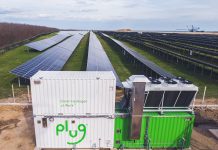Open Access Government keeps up to date on the UK’s transition to 100% green energy, and investigates alternative energy sources that will contribute to meeting this target
The Rt Hon Alok Sharma MP is the Secretary of State for Business, Energy & Industrial Strategy, and has plans to make the UK a world leader in green energy. His priorities consist of ensuring that the UK has secure energy supplies that are reliable, affordable and clean.
In a previous 2020 edition of Open Access Government, it was noted that Alok Sharma is the COP26 President, in which he works on the path towards a successful, globally ambitious journey to net-zero carbon. More recently, however, Sharma has called for the world to “up its ambition.” He went on to state that “we are at a critical moment. The clock is ticking on climate action. Temperatures are soaring. Storms are raging. And crops are failing. And if we do not take this chance, every single one of us will be affected. We all have a part to play. Countries, regions, businesses, people. Together, through our collective effort, we can make a difference in tackling the climate crisis. By shifting investment, spurring innovation, scaling up technologies and driving down costs,” stressed the Secretary of State for Business, Energy and Industrial Strategy.
Proof that this is effective is the use of renewable technologies, as every time the global deployment of solar energy has doubled, its costs have fallen by almost 30%. Thus, Sharma has committed the UK to using 100% renewable energy by 2050 at the latest, through the ‘RE100’ initiative. Furthermore, the Prime Minister announced in December 2020 a new ambitious target to reduce the UK’s emissions by at least 68% by 2030, compared to 1990 levels, following the UK’s departure from the EU.
As green energy is leading the way towards these goals, it causes us to look into the future and question the role that oil and natural gas will continue to play, considering over half of the UK’s electricity now comes from clean sources including wind and solar energy. The government announced towards the end of 2020 that it will be reviewing its policy on future UK offshore oil and gas production, in a way that does not go against tackling climate change. There remains an ongoing demand for oil and natural gas, as the sector supports 270,000 jobs, and they are still required for heating, cooking and transport, and vital to the production of many everyday essentials like medicines, plastics, cosmetics and household appliances. This is likely to remain the case over the coming decades as the UK transitions to low carbon solutions.
Sharma added that “while we have decarbonised our economy faster than any other major country over the past two decades, the oil and gas sector will continue to be needed for the foreseeable future as we move towards net-zero carbon emissions by 2050.”
Fusion energy
In December 2020, the UK government asked local communities to step forward with proposals to house a prototype fusion power plant in a move that could propel the country on to the global stage in a world first. The successful bidder could be first in line for thousands of new, local highly skilled jobs, putting them at the heart of the government’s green industrial revolution. It also follows Prime Minister’s ten-point- plan for a green industrial revolution, (which will create and support up to 250,000 British jobs by 2030,) and the UK’s ambition to be the first country in the world to commercialise fusion energy technology.
“We want the UK to be a trailblazer in developing fusion energy by capitalising on its incredible potential as a limitless clean energy source that could last for generations to come,” stated Alok Sharma.
Raising the ambition for UK renewable energy
This causes us to question the benefits and potential of fusion energy. Fusion research aims to copy the process which powers the sun for a new source of clean energy here on earth on a huge scale. When light atomic nuclei fuse together to form heavier ones, a large amount of energy is released, and to do this, fuel is heated to extreme temperatures, 10 times hotter than the centre of the sun, forming a plasma in which fusion reactions take place. A commercial power station will use this energy produced by fusion reactions to generate electricity. Fusion has a huge potential to be a long-term energy source that is environmentally responsible (as it has no carbon emissions.) It is inherently safe with abundant and widespread fuel resources (the raw materials are found in seawater and the earth’s crust.)
Marine energy
There is also the resource of marine renewables that can be utilised, and the government has recognised this, by launching a consultation on how to support marine energy projects. Marine renewables include emerging technologies such as floating offshore wind farms, tidal stream and wave energy, and could truly benefit every part of the UK. In August 2020, Secretary of State for Business and Energy Alok Sharma high- lighted: “As an island nation we are perfectly placed to capitalise on clean marine energy, building on our world-leading position in offshore wind. Examining how to make the most of our natural resources and support marine technologies that are cost-effective for the consumer will be crucial as we build back better, creating green jobs and reaching net-zero emissions by 2050.”














